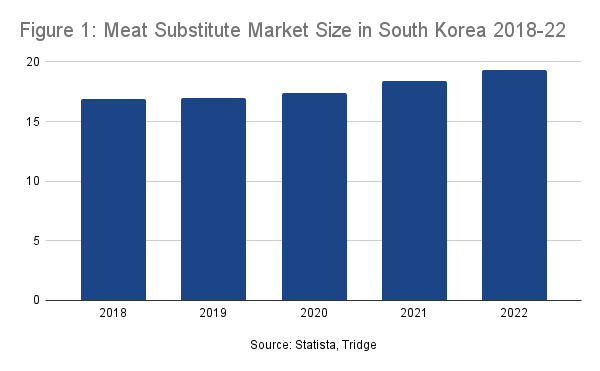South Korea's Progressive Step Towards a Plant-Based Future

The comprehensive National Plan encompasses a wide range of measures, such as establishing a specialized research facility for alternative protein and enhancing the export capacity for Korean plant-based foods. Additionally, it outlines strategies to incorporate a higher proportion of domestically-sourced ingredients in the creation of plant-based substitutes for meat and dairy.
The legal framework for plant-based foods was first established in 2022 when the Ministry of Food and Drug Safety (MFDS) of the Republic of Korea included official guidance for plant-based meat alternatives in its 2022 National Plan. This included a focus on the safety, manufacturing processes, and regulatory approval of cultivated meat. These initiatives are poised to revolutionize the food industry, aligning South Korea with the global shift towards more sustainable and ethical consumption patterns of alternative proteins.
According to the Good Food Institute (GFI), the plant-based foods market in Europe surged to approximately EUR 5.8 billion in 2022, whereas in South Korea, it was estimated at less than EUR 20 million. Despite this disparity, there is a notable shift in South Korea's market dynamics, with a burgeoning awareness of plant-based lifestyles indicating the industry's potential for growth. Among different plant-based products, there has been a notable growth in meat alternatives in South Korea over the past five years. As shown in Figure 1, the market size of plant-based meat alternatives in South Korea in 2022 reached nearly USD 20 million.

According to the Food and Agriculture Organization of the United Nations (FAO), livestock emits 14.5% of the world's total greenhouse emissions. Of this figure, 65% comes from cows. Plant-based meat using proteins extracted from plants, such as soybeans, wheat, and other plants, produces 90% less carbon emissions than animal meat.
There has been increasing demand in South Korea for plant-based foods as more and more people prefer being vegan due to health and environmental concerns. According to the Korea Vegetarian Union, more than 2.5 million people in South Korea are currently following some sort of plant-based diet, and more than 500,000 people are vegans who do not consume any animal-based foods at all.
In early Oct-23, a Korean company specializing in plant-based alternatives for meat and seafood, UNLIMEAT, collaborated with prominent United States (US) vegan egg company “Just Egg'' to create plant-based kimbaps.
Figure 2: UNLIMEAT x JUST Egg Kimbap

Source: UNLIMEAT and JUST Egg
UNLIMEAT, a well-known Korean plant-based meat brand, is expanding its penetration into the US market lately. The company revealed plans to commence sales in 1,500 Albertsons outlets across the US from January 2023. Among the offerings are plant-based Korean BBQ and two varieties of pulled pork, which represent the brand's top-selling products.
Figure 3: UNLIMEAT’s plant-based pulled pork

Source: UNLIMEAT
In early Oct-23, Nongshim’s plant-based meat brand, Veggie Garden, expanded to more than 18 products, including plant-based versions of traditional Korean foods like grilled steak and meatballs.
Figure 4: Nongshim’s Plant-based Foods

Source: Nongshim
In Nov-21, Zikooin, one of the largest producers of vegan beef, announced its intentions to construct a new production facility. This upcoming plant is anticipated as one of Asia’s largest plant-based manufacturing facilities. The expansion in production capacity is viewed as a strategic move to enhance exports and secure a larger share of the global alternative protein market for South Korea.
South Korea's recent unveiling of the National Plan for developing the plant-based food industry signifies a significant leap forward in the nation's commitment to fostering plant-based foods, especially meat alternatives. The Korea Rural Economic Institute forecasts that the country’s meat substitute market will reach USD 207.4 million by 2026. The Korea International Trade Association predicts that plant-based meat will be more in demand than animal meat by 2040.
References:
Tridge Data & Intelligence https://www.tridge.com/
Ministry of Agriculture, Food, and Rural Affairs (MAFRA) of the Republic of Korea https://www.mafra.go.kr/english/index..do
Ministry of Food and Drug Safety (MFDS) of the Republic of Korea https://www.mfds.go.kr/eng/index.do
Korea Vegetarian & Vegan Association https://vegansociety.kr/
Korea Institute of Rural Economics https://www.krei.re.kr/eng/index.do
Korea International Trade Association https://www.kita.org/
Statista https://www.statista.com/statistics
Good Food Institute (GFI) https://gfi.org/
Food and Agriculture Organization of the United Nations (FAO) https://www.fao.org/home/en
Vegconomist - Vegan Business Magazine https://vegconomist.com/

